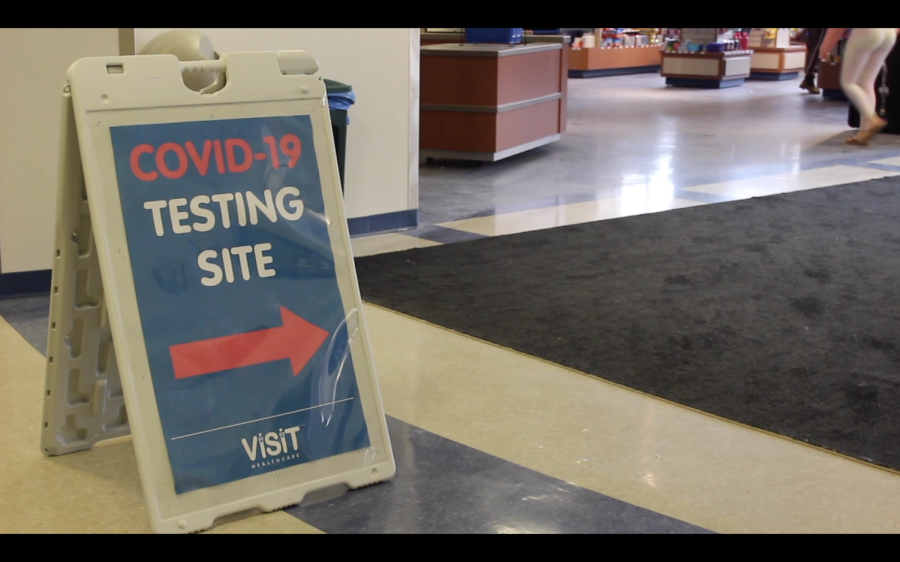Kent State to freeze registration of students not in compliance with vaccine mandate
The Visit Healthcare testing center at Eastway was one of several walkup COVID-19 testing centers on campus. Feb. 4, 2022. (The Kent Stater Files)
Starting next semester, Kent State University will place a registration hold on any student who has not been fully vaccinated or been granted an exemption.
The university’s vaccine mandate has been in place since Dec. 20, but this will be the first action taken to enforce that mandate on non-compliant students.
“We feel [students have] had sufficient time to get compliant with our vaccine requirement,” Manfred van Dulmen, interim associate provost for academic affairs, said. “For students who have not taken any action so far, they have been informed that they will receive a hold on their registration for the next semester.”
Van Dulmen appeared alongside university president Todd Diacon and several other university personnel to speak with student media members about the state of Kent State’s ongoing COVID-19 response.
Diacon said the university’s response is built off of information from the CDC and public health experts, including those available on campus, but also tries not to make students uncomfortable.
One area in which the university’s response has diverged from what the CDC recommends is physical distancing, and while the CDC still recommends physical distancing of three feet, the university no longer has any such requirement.
“When we moved into the fall semester and started to plan for the spring semester, we felt that we could remove the physical distancing requirement, also based on our conversations with all the other universities in the state,” van Dulmen said.
He said that the vaccine requirement and the increased number of vaccinated people on campus made physical distancing less necessary.
“The entire pandemic is just balancing various knowns and unknowns,” Diacon said. “We balanced between what we might do if we were completely in control of everything versus what the state and other authorities say that we can do.”
Diacon also talked about trying to find a balance between faculty and students who may have different feelings about whether classes should be in person or online.
“We try to be empathetic individuals,” he added. “[That means] understanding that in a university with 36,000 students and 5000 employees, people have different levels of comfort with different approaches to COVID to living in a COVID-19 pandemic.”
The majority of those across all Kent State campuses have been fully vaccinated, but the average is brought up substantially by the main campus, where students are vaccinated at a rate about 50 percent higher than regional campuses.
Across all Kent State campuses 83.2 percent of faculty and 71.71 percent of students are vaccinated against COVID-19, according to the university’s COVID-19 dashboard. Those levels are 83.99 and 76.28 percent respectively on the main campus.
4.6 percent of university employees and 7.8 percent of students on the Kent campus have received an exemption for medical, religious or personal reasons.
“I’m pleased at the vaccination numbers in the sense that all of our campuses have higher vaccination rates than the counties in which they are located,” Diacon said. “I think that’s a great indicator that our Kent State students and our Kent State staff and faculty are really buying into the efficacy of vaccines.”
“I think that’s probably why Professor Zullo was saying that this is one of the safest places to be in Northeast Ohio, because of how high our vaccination rates are amongst our Kent campus students and workers.”
Vaccines are one important aspect of what Kent State calls its “pandemic institutionalization effort,” the system by which Kent State seeks to build a consistent and reliable system to handle COVID on campus.
“One of the things that we’ve done as a university is develop a pandemic institutionalization effort to really say [COVID-19 response is] important, this is not going away, and we need to develop an organizational structure at the university to help manage COVID,” van Dulmen said. “Melissa Zullo is currently the director of this pandemic institutionalization effort that oversees the COVID response team, testing data, and all the pieces that go with this, but we really have been the first institution in the state that has recognized that this is such a big job.”
Zullo, interim dean of the College of Public Health, also attended the meeting with student media, and talked about Kent State’s mitigation strategy going forward.
She shared that the Kent campus receives 1,500 rapid tests through the Ohio Department of Health per week, and that students can walk in for a PCR test at a number of locations.
Zullo also shared that Kent State will not add a booster shot to its vaccine requirement, but will recommend faculty and students receive one.
“We are working on our prevention strategy for summer and fall [semesters], and hope to have more information out in the next couple of months,” Zullo said. “But we do strongly encourage the booster. The whole language of the CDC complicates things, how they’re saying ‘staying up to date with your vaccinations’ as well as fully vaccinated. But right now we’re sticking with the fully vaccinated [requirement] and strongly encouraging a booster.”
Van Dulmen also touched on the developing nature of the university’s COVID response, and said that changes to mandates and testing have been common across the state.
“Most universities in the state that have a vaccine requirement have tremendously backed off of any enforcement or testing requirements,” van Dulmen said. “And they’ve been open about that. So that’s that, I’m not telling you anything that is not public.”
It now appears that starting in the summer semester of 2022, there will no longer be any non-compliant students or faulty on Kent campus.
Owen MacMillan is a digital content manager. Contact him at [email protected].


